(完整word版)瞬间动词用法总结
英语语法:瞬间动词和持续性动词1--2

英语语法:瞬间动词和持续性动词1--2瞬时动词和连续性动词(1)瞬时动词表示短暂、不能连续一段时刻的动作,如come, go, lea ve,start, begin, become, receive, die;而连续性动词表示能连续一段时刻的动词,如work,stay, live, learn等。
列举一些常用的瞬时动词和连续性动词:leave离开(瞬时动词)be away离开(连续性动词)fall ill生病(瞬时动词)be ill生病(连续性动词)borrow借(瞬时动词)keep借(连续性动词)catch (a) cold患感冒(瞬时动词)have a cold患感冒(连续性动词)buy买(瞬时动词)have买(连续性动词)join the army参军(瞬时动词)be in the army参军(连续性动词)(2)瞬时动词,用于现在完成时表示动作的完成。
比如:He has just left.他刚走。
They have arrived here.他们差不多到了。
The play has begun.戏开始了。
He has become awell-known writer.他已成了知名作家英语作业一、选择填空。
1. When the boy saw a small fire at one end of the ship, there was nobody around, andin on time, the small fire ___ dangerously big.A. had grownB. has grownC. grewD. is growing2.—What about the sale of cars here?—Well,it was OK at the beginning of this year, but the number ___ down in March. Nowsale is rising again.A. fellB. has fallenC. had fallenD. falls参考答案:1-2:CA二、分析句子的语法结构,并译成中文。
谈谈瞬间动词的进行式用法
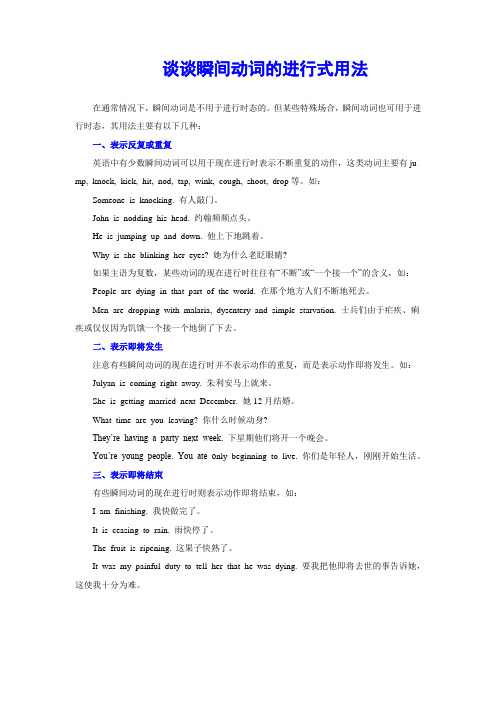
谈谈瞬间动词的进行式用法在通常情况下,瞬间动词是不用于进行时态的。
但某些特殊场合,瞬间动词也可用于进行时态,其用法主要有以下几种:一、表示反复或重复英语中有少数瞬间动词可以用于现在进行时表示不断重复的动作,这类动词主要有ju mp, knock, kick, hit, nod, tap, wink, cough, shoot, drop等。
如:Someone is knocking. 有人敲门。
John is nodding his head. 约翰频频点头。
He is jumping up and down. 他上下地跳着。
Why is she blinking her eyes? 她为什么老眨眼睛?如果主语为复数,某些动词的现在进行时往往有“不断”或“一个接一个”的含义,如:People are dying in that part of the world. 在那个地方人们不断地死去。
Men are dropping with malaria, dysentery and simple starvation. 士兵们由于疟疾、痢疾或仅仅因为饥饿一个接一个地倒了下去。
二、表示即将发生注意有些瞬间动词的现在进行时并不表示动作的重复,而是表示动作即将发生。
如:Julyan is coming right away. 朱利安马上就来。
She is getting married next December. 她12月结婚。
What time are you leaving? 你什么时候动身?They’re having a party next week. 下星期他们将开一个晚会。
You’re young people. You ate o nly beginning to live. 你们是年轻人,刚刚开始生活。
三、表示即将结束有些瞬间动词的现在进行时则表示动作即将结束,如:I am finishing. 我快做完了。
英语瞬间性动词变延续性动词
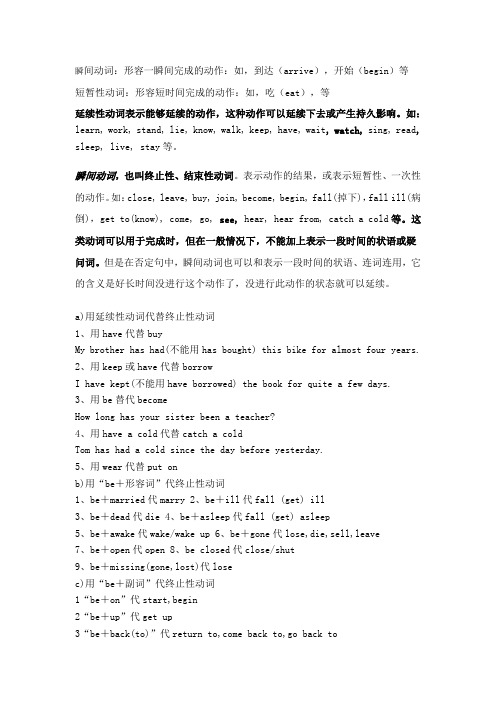
瞬间动词:形容一瞬间完成的动作:如,到达(arrive),开始(begin)等短暂性动词:形容短时间完成的动作:如,吃(eat),等延续性动词表示能够延续的动作,这种动作可以延续下去或产生持久影响。
如:learn, work, stand, lie, know, walk, keep, have, wait, watch, sing, read, sleep,live, stay等。
瞬间动词,也叫终止性、结束性动词。
表示动作的结果,或表示短暂性、一次性的动作。
如:close, leave, buy, join, become, begin, fall(掉下),fall ill(病倒),get to(know), come, go, see, hear, hear from, catch a cold等。
这类动词可以用于完成时,但在一般情况下,不能加上表示一段时间的状语或疑问词。
但是在否定句中,瞬间动词也可以和表示一段时间的状语、连词连用,它的含义是好长时间没进行这个动作了,没进行此动作的状态就可以延续。
a)用延续性动词代替终止性动词1、用have代替buyMy brother has had(不能用has bought) this bike for almost four years.2、用keep或have代替borrowI have kept(不能用have borrowed) the book for quite a few days.3、用be替代becomeHow long has your sister been a teacher?4、用have a cold代替catch a coldTom has had a cold since the day before yesterday.5、用wear代替put onb)用“be+形容词”代终止性动词1、be+married代marry2、be+ill代fall (get) ill3、be+dead代die4、be+asleep代fall (get) asleep5、be+awake代wake/wake up6、be+gone代lose,die,sell,leave7、be+open代open 8、be closed代close/shut9、be+missing(gone,lost)代losec)用“be+副词”代终止性动词1“be+on”代start,begin2“be+up”代get up3“be+back(to)”代return to,come back to,go back to4“be here (there)”代come(arrive,reach,get) here或go(arrive,reach,get) thered)用“be+介词短语”代终止性动词1.“be in/at +地点”代替go to /come to2.用be in the army 代替join the army3.“be in/at +地点”代替move to常用的就是:leave→be away, borrow→keep, buy→have, begin/start→be on, die→be dead, move to→live in, finish→be over, join→be in/be a member of, open sth.→keep sth. open, fall ill→be ill, get up→be up, catch a c old→have a cold。
4句顺口溜记住完成时态中15个瞬间性动词与延续性动词的转换

4句顺口溜记住完成时态中15个瞬间性动词与延续性动词的转换(图上的表达有没有错?如果想来表达同样的意思,你会怎样表达?)现在完成时态有两种用法:一是表示某个动作到现在为止已经完成,二是表示某个动作从过去一直持续到现在。
在第二种用法中,动词需要用延续性动词,常见且容易考的延续性动词并不是很多。
为了方便大家掌握,我把这些动词编成下面这4句顺口溜:借买离开死来到,开始加入患感冒,打开关上又担心,回来结婚睡着了。
上面这四话话中包含15个瞬间性的动词,又叫终止性动词。
现在我们来对其中的每一个动词进行解释。
在下面每一组中文意思的后面,前面一个词是瞬间性动词,后面一个词是对应的延续性动词:1、借:borrow—keepBorrow不具有延续性,但可用keep替换,因为keep本身的意思表示“保存”,它具有延续性。
如:I have borrowed the book for two days. 这本书我借了两天了。
(错误,改为kept)2、买:buy—haveBuy不具有延续性,但have表示“有”,这是一种状态,当然就有延续性。
如:He has bought this bike for half a year.这辆自行车买了有半年了。
(错误,改为had)3、离开:leave—be awayLeave不具有延续性,但be是表状态的词,所有表状态的词都具有延续性。
如:He has left here since last year. 他自从去年就离开这儿了。
(错误,改为been away)4、死:die—be deadDie是瞬间性动词,马上发生也马上结束了,“死”这个动作不可能持续好长一段时间,但be dead表示“是死的”,自然就能持续了。
如:His grandpa has died for two years. 他爷爷去逝两年了。
(错误,改为been dead)5、来:come (to)—be (in/at)表示来到城市、国家等大地方,就用be in,如果是来到一个小地方,介词就用at。
英语瞬间动词表完成状态的用法

一、瞬间动词与现在完成时英语中,有些动词只表示短暂的动作,所表示的动作瞬间即可完成,因此这类动词称为瞬间动词或终止性动词。
如:close, open, join, buy, die, begin, start, come, go等。
瞬间动词都可以表示动作“已完成”。
如:I have lost my watch.我把表丢了。
瞬间动词不能和表示一段时间的短语或从句连用。
不能与How long 连用I have bought my watch for ten years.(×)She has turned on the light since she came in. (×)瞬间动词的“已完成”动作如果要与表示一段时间的状语(或状语从句)连用,一般可以通过下面几种方式来表示:1. 用意义相近或相同的延续性动词来代替,这种延续表达法大都是表示状态的。
如:His father has been dead for five years.(not“has died”)他爸爸去世五年了。
为了便于掌握,下面将瞬间动词转换成延续性动词的情况列举如下:arrive, come→be here, be inbegin, start→be onbuy→havedie→be deadfinish, end→be overget up→be upgo out→be outjoin→be in, be a +名词leave, move→be away, be out ofborrow→keep2. 用“It is/ has been +时间+since…”句型。
如:It is/ has been 10 years since I last saw him.(从我上次见到他以来已经10年了。
)It is five minutes since the meeting began. 会议开始五分钟了。
It is two years since we got to know each other. 我们互相认识已有两年了。
(word完整版)常用瞬间动词变延续性动词表

常用瞬间动词变延续性动词表①have arrived at/in sp, got to/reached sp, come/gone/ moved to sp→have been in sp②have come/gone back, returned→have been back③have come/gone out→have been out④have become→have been⑤have closed/opened→have been closed/open⑥have got up→have been up⑦have died→_have been dead⑧have left sp→__have been away from sp⑨have fallen asleep/gone to sleep→have been asleep⑩have finished/ended/completed→_have been over⑪have married→have been married⑫have started/begun to do sth→have done sth⑬have begun→_have been on⑭have borrowed→_have kept⑮have bought→have had⑯have lost→haven’t had⑰have put on→have worn⑱have caught/got a cold→have had a cold⑲have got to know→have known⑳have gone to→have been inhave joined/taken part in the league/the Party/the army→have been a member of the league/the Party/the army, have been in the league/the Party/the army,have been the Party's member/the league member/the soldier。
瞬间性动词与延续性动词
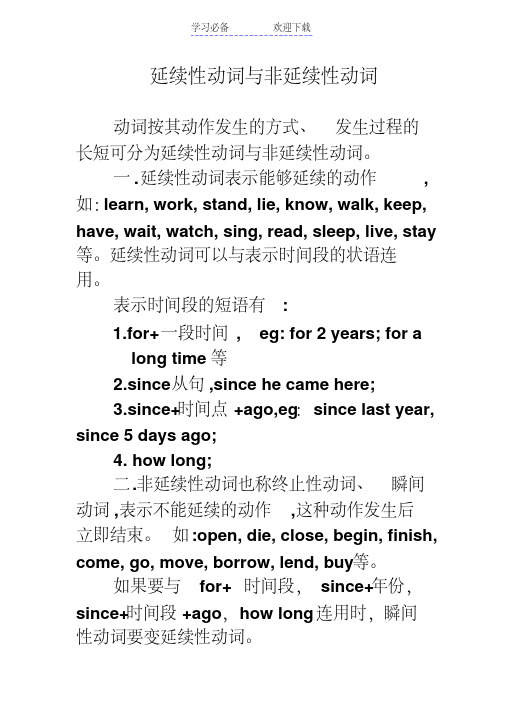
延续性动词与非延续性动词动词按其动作发生的方式、发生过程的长短可分为延续性动词与非延续性动词。
一.延续性动词表示能够延续的动作,如:learn, work, stand, lie, know, walk, keep, have, wait, watch, sing, read, sleep, live, stay 等。
延续性动词可以与表示时间段的状语连用。
表示时间段的短语有:1.for+一段时间, eg: for 2 years; for along time等2.since从句,since he came here;3.since+时间点+ago,eg:since last year, since 5 days ago;4. how long;二.非延续性动词也称终止性动词、瞬间动词,表示不能延续的动作,这种动作发生后立即结束。
如:open, die, close, begin, finish, come, go, move, borrow, lend, buy等。
如果要与for+ 时间段,since+年份,since+时间段+ago,how long连用时,瞬间性动词要变延续性动词。
三.延续性动词与非延续性动词之间的转换:非延续性动词延续性动词leave be away(from)borrow keepbuy havebegin/start be ondie be deadfinish be overjoin be in+组织机构;be amember of+组织机构open sth. keep sth. opencome here be herego there be therebecome become back be backbe (in)/stay(in/at)come to/get to/arrive(in/at)/reach/move togo (get) out be output on wearfall ill be illget up be upcatch a cold have a coldfall asleep be asleepget to know knowwake up be upclose be closed例:(1)他死了三年了。
瞬间动词用法总结

瞬间动词用法总结瞬间动词是指动作在很短时间内完成,无延续性。
它也称非延续性动词或短暂性动词。
如:come, go, leave, arrive, join, borrow, lend, die, begin, start等.1.I have had the bike for three years.(买)瞬间动词的完成时肯定式不能与表示一段时间的for 时间状语连用。
2.How long have you been away from Guangzhou?(离开)瞬间动词不与How long引导的疑问句连用。
3. Could you look after my baby while I am away?(离开)瞬间动词不与while引导的时间状语连用。
4.I have learned English since 1995。
(开始学习)瞬间动词不与since引导的时间状语连用。
5. I’ll be there and stay until next week. (去呆在那里)瞬间动词不与until引导的时间状语连用。
6.Tom has ever been to China twice.(到过)7.How long can I keep this book?(借)8.He has been in the league for two years.(加入)9. He has been a league member for 3 years。
(加入)10.She has been away from home for 3 years.(离开)11.When we got to the cinema, the film had been on for 10 minutes.(开始)12.He has been dead for 5 years.(死亡)13. She has been here for 2 month.(来)14.She has been a party member for 5 years.(加入)15.He hasn’t come back for over a year.瞬间动词的完成时否定式能与表示一段时间的for 时间状语连用。
常用瞬间动词所表示的动作在瞬间就可以完成

常用瞬间动词所表示的动作在瞬间就可以完成,不能延续下去,即动作从开始到结束所持续的时间极短。
但常用瞬间动词也可变延续性动词,下面举出部分常用词表:1. have arrived at/in sw. got to/reached sw. come/gone/moved to sw.→have been in sw./at…相应的介词2. have come/gone back/returned →have been back3. have come/gone out →have been out4. have become →have been5. have closed / opened→have been closed/opened6. have got up →have been up;7. have died →have been dead;8. have left sw. →have been away from sw.9. have fallen asleep/got to sleep →have been asleep;10. have finished/ended/completed →have been over;11. have married →have been married;12. have started/begun to do sth. →have done sth. ;13. have begun →have been on14. have borrowed/bought →have kept/had15. have lost →haven’t had16. have put on →have worn17. have caught /get a cold →have had a cold;18. have got to know →have known19. have/has gone to →have been in20. have joined/have taken part in the league/the Party/the army→have been a member of/ have been in/have been the Party’s member/the league member/the soldier…。
(完整word版)瞬间动词用法总结

中考瞬间动词用法总结瞬间动词又称非延续性动词,可以有现在完成时态,但不可以接一段时间.若要接一段时间,需要做一些相应的变换.瞬间动词在完成时态中的否定式可以接一段时间.如:I haven’t bought anything for two months。
常用瞬间动词有:1, come,go, get to, reach,arrive,leave,see,hear2. buy, sell, open, close,get up3。
join,take part in,begin,start, return, give, borrow, lend4,become, turn, bring,take, die, finish,end, receive,hear from, marry,The spaceship is returning to the earth.I'm leaving for Hangzhou.Wrong: How long have you left school?How long is it since you left school?How long ago did you leave school?How long have you been away from school?Wrong: He has bought the computer for two months.He has had the computer for two months。
He bought the computer two months ago。
It is (has been)two months since he bought the computer.Two months have passed since he bought the computer.I didn’t know it until yesterday。
短暂性动词的用法
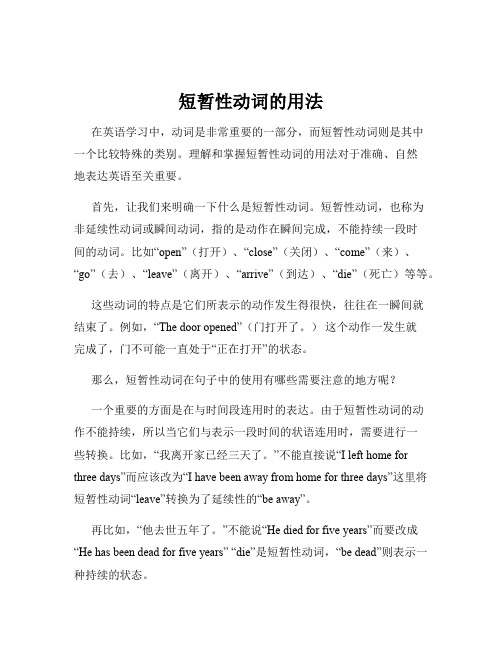
短暂性动词的用法在英语学习中,动词是非常重要的一部分,而短暂性动词则是其中一个比较特殊的类别。
理解和掌握短暂性动词的用法对于准确、自然地表达英语至关重要。
首先,让我们来明确一下什么是短暂性动词。
短暂性动词,也称为非延续性动词或瞬间动词,指的是动作在瞬间完成,不能持续一段时间的动词。
比如“open”(打开)、“close”(关闭)、“come”(来)、“go”(去)、“leave”(离开)、“arrive”(到达)、“die”(死亡)等等。
这些动词的特点是它们所表示的动作发生得很快,往往在一瞬间就结束了。
例如,“The door opened”(门打开了。
)这个动作一发生就完成了,门不可能一直处于“正在打开”的状态。
那么,短暂性动词在句子中的使用有哪些需要注意的地方呢?一个重要的方面是在与时间段连用时的表达。
由于短暂性动词的动作不能持续,所以当它们与表示一段时间的状语连用时,需要进行一些转换。
比如,“我离开家已经三天了。
”不能直接说“I left home for three days”而应该改为“I have been away from home for three days”这里将短暂性动词“leave”转换为了延续性的“be away”。
再比如,“他去世五年了。
”不能说“He died for five years”而要改成“He has been dead for five years” “die”是短暂性动词,“be dead”则表示一种持续的状态。
在现在完成时中,短暂性动词的使用也有特定的规则。
如果句子中有“since”或“for”引导的时间状语,通常要用延续性动词。
例如,“Ihave known him since 2010”(自从 2010 年我就认识他了。
)而不能说“I have known him since he came here” 因为“come”是短暂性动词。
在进行句型转换时,短暂性动词也需要特别处理。
瞬间动词用法

瞬间动词瞬间动词,也叫终止性动词、结束性动词、非延续性动词。
这类动词所表示的动作在瞬间就可以完成,不能延续下去,即动作从开始到结束所持续的时间极短。
瞬间动词往往表示动作的结果,或表示短暂性、一次性的动作。
一般不能同表示一段时间的状语连用。
(一)这类动词常见的有:arrive,become,begin,buy,catch(感染,染上,如:catch a cold),close,come,fall,fall ill,find,get to(know),go,hear,hear from,join,kill,land(着陆),leave(离开),lose,see,等。
例如:1. He has joined the club for a long time. (错)2. He has been a member of the club for a long time . (对)3. His grandfather has died for over 30 years. (错)4. His grandfather has been dead for over 30 years . (对)【注意】之所以将这些动词称为瞬间动词,是因为这些动词在眨眼之间发生并终结。
故不能与表达“段”的长时间状语连用,不论是在进行时还是现在完成时中。
下面的例句是正确的:1. He is dying.2. He has died.一个生物体是死是活,界与其终结生命的前与后的一霎那,如果上述例句加上了表达段的时间状语,试请问:该人是死是活?(二)但是,有几个表示去向的非延续性动词如go,come,start,leave 等,可以同表示时间段的状语for 短语连用。
但要注意,这种用法的for 短语表示的不是句中谓语动词延续的时间,而是该动词动作完成后再做某事所需要的时间。
例如:1. She has gone to Nanjing for three days. (= She’s come here,intending to stay for three days.)2. Alice has left for Paris for three months . (= Alice has left for Paris ,intending to stay there for three months.)3. We are starting for Shanghai for two weeks. (= We are going to Shanghai ,and we are planning to stay there for two weeks.)【注意】如果遇到与第一点所不符的情况,如本点所讲述,不要轻易下结论为“错题”,应该认真分析后再做结论。
瞬间动词和延续性动词.

一.瞬间动词和延续性动词的含义及用法瞬间动词(非延续性动词或短暂性动词):是指动作在很短时间内完成, 无延续性。
如come go 等终止性动词和延续性动词:延续性动词: live ,run, stay, clean ,play ,hold ,watch ,teach, read ,study,teach ,eat ,drink ,write ,dance , sing ,smoke瞬间性动词:open, stop ,like ,love ,die ,win ,close ,shot ,begin ,start enter ,finish1. 终止性动词:表示不能延续的动作,即动作发生后立即结束。
如:begin,arrive,borrow,buy ,break,close,come,fall,dic,finish,go,leave,lend,mary,reach,receiv e,open,sell ,start,stop 等。
终止性动词的肯定式是不能持续的,所以不能和表示一段时间的状语连用,终止性的否定式就可以和表一段时间的状语连用,因为否定本身就是可以延续的。
如:have a cold是持续性动词,表示“状态”,可与表延续性的时间状语连用,不定冠词不能省略。
I ′ve had a cold since my arrival.I didn′t go to school because I had had a bad cold for days.catch / take ,get a cold是短暂性动作,表“动态”:它不能和延续性时间状语连用,不定冠词“a ”可有可无,catch 可用代替。
Put on your coat ,or you′ll catch / take / get a cold.Take care not to get cold.但是,若cold 前有形容词修饰时,则不定冠词不能省。
瞬间动词的用法
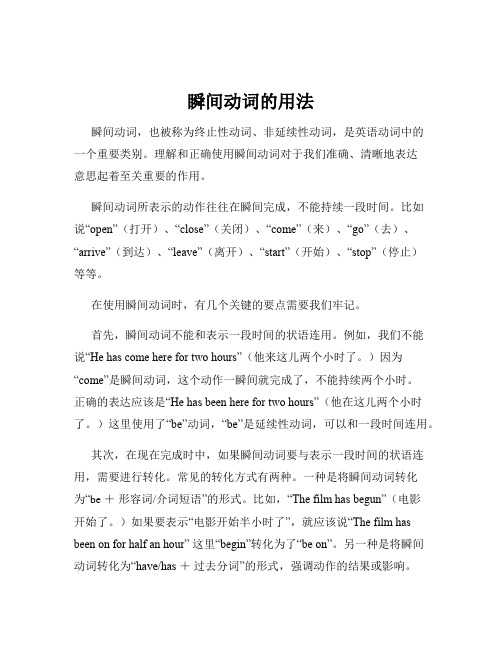
瞬间动词的用法瞬间动词,也被称为终止性动词、非延续性动词,是英语动词中的一个重要类别。
理解和正确使用瞬间动词对于我们准确、清晰地表达意思起着至关重要的作用。
瞬间动词所表示的动作往往在瞬间完成,不能持续一段时间。
比如说“open”(打开)、“close”(关闭)、“come”(来)、“go”(去)、“arrive”(到达)、“leave”(离开)、“start”(开始)、“stop”(停止)等等。
在使用瞬间动词时,有几个关键的要点需要我们牢记。
首先,瞬间动词不能和表示一段时间的状语连用。
例如,我们不能说“He has come here for two hours”(他来这儿两个小时了。
)因为“come”是瞬间动词,这个动作一瞬间就完成了,不能持续两个小时。
正确的表达应该是“He has been here for two hours”(他在这儿两个小时了。
)这里使用了“be”动词,“be”是延续性动词,可以和一段时间连用。
其次,在现在完成时中,如果瞬间动词要与表示一段时间的状语连用,需要进行转化。
常见的转化方式有两种。
一种是将瞬间动词转化为“be +形容词/介词短语”的形式。
比如,“The film has begun”(电影开始了。
)如果要表示“电影开始半小时了”,就应该说“The film has been on for half an hour” 这里“begin”转化为了“be on”。
另一种是将瞬间动词转化为“have/has +过去分词”的形式,强调动作的结果或影响。
例如,“He has left”(他离开了。
)如果要表示“他离开三天了”,可以说“He has been away for three days”再来看瞬间动词在一般过去时中的使用。
在一般过去时中,瞬间动词通常用于表示过去某个时间点发生的动作。
比如,“He came to Beijing yesterday”(他昨天来北京了。
瞬间动词不同用法

瞬间动词不同用法瞬间动词,也叫终止性动词、非延续性动词,是指动作在瞬间完成,不能持续一段时间的动词。
在英语学习中,理解和正确使用瞬间动词对于准确表达意思至关重要。
首先,让我们来明确一些常见的瞬间动词,比如“open”(打开)、“close”(关闭)、“start”(开始)、“stop”(停止)、“come”(来)、“go”(去)、“arrive”(到达)、“leave”(离开)等等。
这些动词所表示的动作往往在一瞬间就完成了。
瞬间动词在句子中的使用有一些特定的规则和需要注意的地方。
当我们想要表达某个动作的发生时,瞬间动词可以直接使用。
例如,“The train arrived at the station just now”(火车刚刚到达车站。
)这里的“arrived”就清晰地表明了到达这个瞬间动作的发生。
然而,当我们要表达一个动作持续的时间或者在一段时间内的状态时,瞬间动词就不能直接与表示一段时间的状语连用。
比如说,我们不能说“He has come here for two days”(×)因为“come”是瞬间动词,不能持续两天。
正确的表达应该是“He has been here for two days”(√)这里使用了“be”动词的现在完成时态来表示持续的状态。
另外,瞬间动词在进行时态中也有其特殊的用法。
一般来说,瞬间动词的进行时态往往表示即将发生的动作。
比如,“The bus is coming”(公交车要来了。
)这里的“is coming”表示即将到来的动作。
瞬间动词还常常与“when”引导的时间状语从句搭配使用。
例如,“When the teacher came in, the students were talking loudly”(当老师进来时,学生们正在大声讲话。
)这里的“came in”是瞬间动作,与“were talking”这个持续的动作形成了对比。
在完成时态中,瞬间动词如果要与表示一段时间的状语连用,就需要进行相应的转换。
谈谈瞬间动词的进行式用法

谈谈瞬间动词的进行式用法在通常情况下,瞬间动词是不用于进行时态的。
但某些特殊场合,瞬间动词也可用于进行时态,其用法主要有以下几种:一、表示反复或重复英语中有少数瞬间动词可以用于现在进行时表示不断重复的动作,这类动词主要有j ump, knock, kick, hit, nod, tap, wink, cough, shoot, drop等。
如:Someone is knocking. 有人敲门。
John is nodding his head. 约翰频频点头。
He is jumping up and down. 他上下地跳着。
Why is she blinking her eyes? 她为什么老眨眼睛?如果主语为复数,某些动词的现在进行时往往有“不断”或“一个接一个”的含义,如:People are dying in that part of the world. 在那个地方人们不断地死去。
Men are dropping with malaria, dysentery and simple starvation. 士兵们由于疟疾、痢疾或仅仅因为饥饿一个接一个地倒了下去。
二、表示即将发生注意有些瞬间动词的现在进行时并不表示动作的重复,而是表示动作即将发生。
如:Julyan is coming right away. 朱利安马上就来。
She is getting married next December. 她12月结婚。
What time are you leaving? 你什么时候动身?They’re having a party next week. 下星期他们将开一个晚会。
You’re young people. You ate only beginning to live. 你们是年轻人,刚刚开始生活。
三、表示即将结束有些瞬间动词的现在进行时则表示动作即将结束,如:I am finishing. 我快做完了。
瞬间动词用法
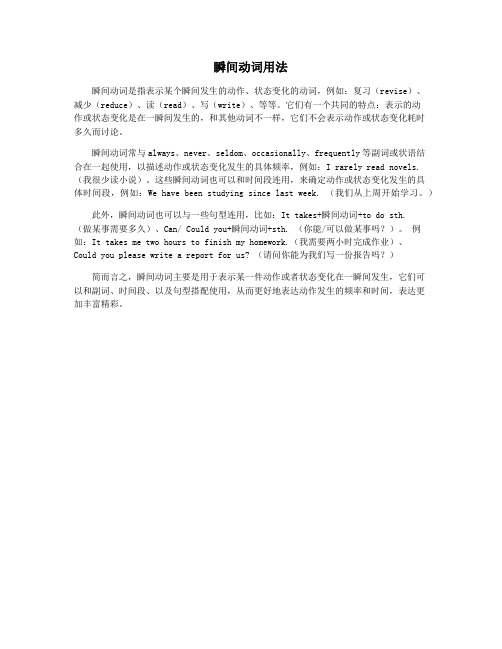
瞬间动词用法
瞬间动词是指表示某个瞬间发生的动作、状态变化的动词,例如:复习(revise)、
减少(reduce)、读(read)、写(write)、等等。
它们有一个共同的特点:表示的动
作或状态变化是在一瞬间发生的,和其他动词不一样,它们不会表示动作或状态变化耗时
多久而讨论。
瞬间动词常与always、never、seldom、occasionally、frequently等副词或状语结
合在一起使用,以描述动作或状态变化发生的具体频率,例如:I rarely read novels.(我很少读小说)。
这些瞬间动词也可以和时间段连用,来确定动作或状态变化发生的具
体时间段,例如:We have been studying since last week. (我们从上周开始学习。
)
此外,瞬间动词也可以与一些句型连用,比如:It takes+瞬间动词+to do sth.
(做某事需要多久)、Can/ Could you+瞬间动词+sth. (你能/可以做某事吗?)。
例如:It takes me two hours to finish my homework.(我需要两小时完成作业)、
Could you please write a report for us? (请问你能为我们写一份报告吗?)
简而言之,瞬间动词主要是用于表示某一件动作或者状态变化在一瞬间发生,它们可
以和副词、时间段、以及句型搭配使用,从而更好地表达动作发生的频率和时间,表达更
加丰富精彩。
瞬间动词的用法是什么(文档6篇)
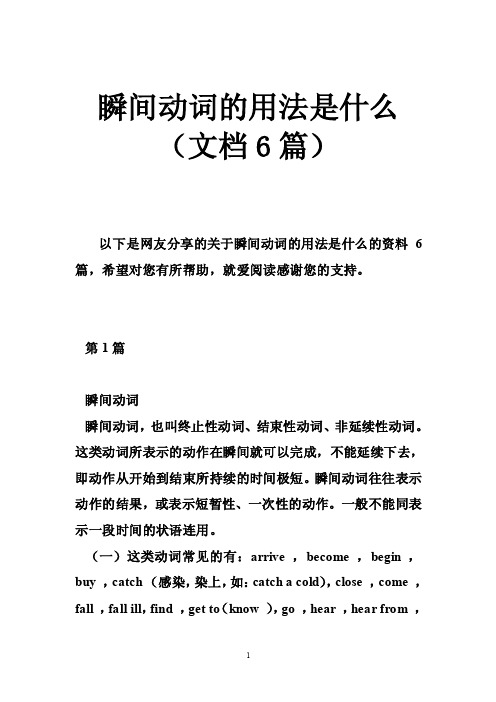
瞬间动词的用法是什么(文档6篇)以下是网友分享的关于瞬间动词的用法是什么的资料6篇,希望对您有所帮助,就爱阅读感谢您的支持。
第1篇瞬间动词瞬间动词,也叫终止性动词、结束性动词、非延续性动词。
这类动词所表示的动作在瞬间就可以完成,不能延续下去,即动作从开始到结束所持续的时间极短。
瞬间动词往往表示动作的结果,或表示短暂性、一次性的动作。
一般不能同表示一段时间的状语连用。
(一)这类动词常见的有:arrive ,become ,begin ,buy ,catch (感染,染上,如:catch a cold),close ,come ,fall ,fall ill,find ,get to(know ),go ,hear ,hear from ,join ,kill ,land (着陆),leave (离开),lose ,see ,等。
例如:1. He has joined the club for a long time. (错)2. He has been a member of the club for a long time . (对)3. His grandfather has died for over 30 years. (错)4. His grandfather has been dead for over 30 years . (对)【注意】之所以将这些动词称为瞬间动词,是因为这些动词在眨眼之间发生并终结。
故不能与表达“段”的长时间状语连用,不论是在进行时还是现在完成时中。
下面的例句是正确的:1. He is dying.2. He has died.一个生物体是死是活,界与其终结生命的前与后的一霎那,如果上述例句加上了表达段的时间状语,试请问:该人是死是活?(二)但是,有几个表示去向的非延续性动词如go ,come ,start ,leave 等,可以同表示时间段的状语for 短语连用。
- 1、下载文档前请自行甄别文档内容的完整性,平台不提供额外的编辑、内容补充、找答案等附加服务。
- 2、"仅部分预览"的文档,不可在线预览部分如存在完整性等问题,可反馈申请退款(可完整预览的文档不适用该条件!)。
- 3、如文档侵犯您的权益,请联系客服反馈,我们会尽快为您处理(人工客服工作时间:9:00-18:30)。
中考瞬间动词用法总结
瞬间动词又称非延续性动词,可以有现在完成时态,但不可以接一段时间.若要接一段时间,需要做一些相应的变换。
瞬间动词在完成时态中的否定式可以接一段时间.
如:I haven’t bought anything for two months.
常用瞬间动词有:
1, come, go, get to, reach, arrive, leave, see, hear
2. buy, sell, open, close, get up
3. join, take part in, begin, start, return, give, borrow, lend
4, become, turn, bring, take, die, finish, end, receive, hear from, marry,
The spaceship is returning to the earth.
I’m leaving for Hangzhou.
Wrong: How long have you left school?
How long is it since you left school?
How long ago did you leave school?
How long have you been away from school?
Wrong: He has bought the computer for two months.
He has had the computer for two months.
He bought the computer two months ago.
It is (has been) two months since he bought the computer.
Two months have passed since he bought the computer.
I didn’t know it until yesterday.
He didn’t return until midnight.
Don’t get off the bus until it has stopped.
瞬间动词的替代办法
a)用延续性动词代替终止性动词
1、用have代替buy
My brother has had(不能用has bought) this bike for almost four years.
2、用keep或have代替borrow
I have kept(不能用have borrowed) the book for quite a few days.
3、用be替代become
How long has your sister been a teacher?
4、用have a cold代替catch a cold
Tom has had a cold since the day before yesterday.
5、用wear代替put on
b)用“be+形容词”代终止性动词
1、be+married代marry
2、be+ill代fall (get) ill
3、be+dead代die
4、be+asleep代fall (get) asleep
5、be+awake代wake/wake up
6、be+gone代lose, die, sell, leave
7、be+open代open
8、be closed代close/shut
9、be+missing(gone, lost)代lose
c)用“be+副词”代终止性动词
1“be+on”代start, begin
2“be+up”代get up
3“be+back(to)”代return to, come back to, go back to
4“be here (there)”代come(arrive, reach, get) here或go (arrive, reach, get) there等
d)用“be+介词短语”代终止性动词
1.“be in/at +地点”代替go to /come to
2. 用be in the army 代替join the army
3.“be in/at +地点”代替move to。
